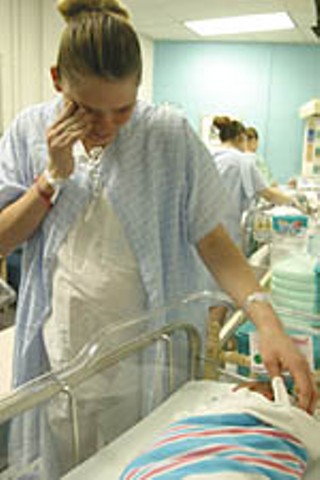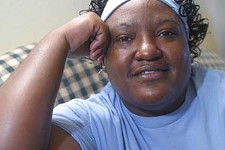Babies Behind Bars
In the mirror world of TDCJ, life goes on
By Lucius Lomax, Fri., July 16, 2004

Last year in Texas prisons there were 399 attempted suicides – 16 successful – and one accidental death, when an inmate fell off his bunk and cracked his skull. Three hundred sixty five inmates died of natural causes. There were 24 executions, and one ordinary homicide.
In addition, there were:
But there's a more amazing statistic, mind-blowing because it is completely contrary to the general mayhem and bad-acting, both by prisoners and guards, for which Texas prisons are famous. This particular stat represents the Other Side of the Force: goodness and light, the blessed future, and (so we imagine) hope for humanity.
In the TDCJ in 2003, there were 284 babies born to inmates.
Multiple Partners
Giving birth in a Texas prison is not exactly a cause for unmixed celebration. The expectant mothers get good prenatal care and professional birthing facilities, and a brief period of postnatal affection and nursing. But shortly after the births, the infants are delivered to whatever outside care arrangements have been made for them, and the mothers return to the general prison population.
Who are the fathers of the children born behind bars? Most often, they're from the old neighborhood – but in at least a few cases, the father is apparently the state of Texas. More precisely, Daddy may wear a uniform.
There are no conjugal visits permitted in state prisons, but despite the best efforts of wardens and administrators, there is apparently booty to be had on the side. Sex between correctional officers and inmates is technically forbidden – a crime, in fact, for guards who indulge. "Sucking," as the practice is generally called by insiders, usually involves inmates exchanging sexual favors with guards in return for preferred work assignments, drugs, money, or goods which the prison commissary doesn't ordinarily carry, like perfume. Sometimes it's not outright commerce – often people on both sides of the bars just want to get laid. It is a polite fiction to believe that someone locked up for 20 years will not try to get his or her groove on. There is also no necessary gender bias in the hunt – female corrections officers can hook up too.

"I've seen female guards led off the unit without so much as a chance to tuck in their shirts," says one former TDCJ lieutenant. She notes that, as a supervisor, she found the most suspicious sign of a possible booty call to be a guard showing up at the prison when not scheduled for duty. Female guards, for instance, are said to be particularly attracted to some of the young male inmates, who often don't have much to occupy themselves except bodybuilding, and who, by definition, have plenty of that bad-boy charisma that some women seem to love. Eyes may meet furtively during strip searches. Fingers may touch in the chow line or at supervised exercise. The action goes horizontal from there.
"My brother has been locked up since he was 16, and he's got three babies with guards," says one nurse who occasionally works with the prison population. "I been free-world all my life," she marvels, "and I only got one."
In the case of babies born in TDCJ, however, the horizontal action is reversed. It's the more typical male guard and female prisoner tryst – a meet-you-behind-the-cellblock kind of encounter. Don't jump to the conclusion that guards are forcing the prisoners to have sex – only two guards, one male and one female, were charged with forcible sexual assault last year – because in many cases it's consensual.
"Most of the women are not complaining," said one official who often talks to prisoners/patients about sex in TDCJ's more than 100 state prison and jail facilities. Many of the women are said to want to become pregnant because of the better treatment given pregnant women, even if only such a simple luxury as a well-ventilated room. The prison system is not forthcoming about how many employees, if any, were charged with having consensual relations last year. Complaints would theoretically lead to DNA tests. The sex "is promoted by the women themselves, or by the guards. I suspect that legislators know," said the above official, "if they've been around for a while. They need to get control of the situation."
That's a view apparently held by those closer to the action as well. One TDCJ guard, who works at the prison hospital in Galveston and spends considerable time accompanying inmates over to the nearby public hospital to have their babies delivered, just shrugged as if that's old news. "Some of 'em come in [to prison] pregnant," she said. "Some of 'em get pregnant by TDCJ officers. It happens all the time."
Not according to the official line. A recent study by the prison system's general counsel of the 284 moms who gave birth in the big house last year found none who had been "in the system" more than nine months – the obvious indicator that impregnation took place within the walls of a Texas prison unit – though in four of those 284 cases, the TDCJ general counsel said it is "unknown" when the moms actually entered the system. (While we're on the subject of sex, an average of more than one inmate a day is contracting HIV in Texas prisons. That suggests there is booty to be had in the privacy of cells, inmate on inmate, at least some of it without consent.)
Healthy Babies
The statistics are apparently better maintained in the Texas Youth Commission, the state's juvenile incarceration system. Among that inmate population, there were 24 births in 2003. Seven of the 24 had been in custody for more than nine months, but a department spokesman explains, "Of those seven, all were in community placements on parole status at a time nine months prior to giving birth, save one who was on escape/abscond status at that time."
TYA also does better by its new moms than TDCJ. Depending upon good behavior, juvenile mothers are sometimes allowed to live for up to six months with their babies at a facility near Victoria. "In order to be eligible, this means behavior is under control and the youth is demonstrating understanding of triggers for offensive behavior, demonstrating leadership by appropriately confronting others, and demonstrating some victim empathy," according to TYA spokeswoman Pamela Ward. "The babies are three years of age or younger. Each mother and her baby share a room that consists of a bed for mom, a crib or toddler bed, a chest of drawers, limited shelving space, and a bathroom. All rooms have a sliding glass door and open into a common hallway with cameras to insure safety and security. Staff check – look in on – youth every 15 minutes at night." The program is called WINGS: Women in Need of Greater Strengths.
Studies show that prisoner mothers who are allowed to bond are less likely to reoffend. That's a theory also subscribed to in the adult prison system where, in the future, administrators hope to provide more bonding time for moms, who now only get about a day or so with their babies. Then family or foster care takes the newborn away.
"If we break that bond that was never made," one TDCJ official warned, speaking of the prison offspring, "we're creating a new generation of inmates."
It's a tough sell at the Legislature, though. "If you're asking me whether I care that prisoners are not allowed to bond with their babies after birth," said House Corrections Committee member Rep. Pat Haggerty, R-El Paso, "the answer is no."
If all of this sounds a little sad, it is. But there's a kind of silver lining to this particular cloud, something that the state of Texas can recite with pride and shame at the same time. The clinical outcomes for the prisoner moms of TDCJ, measured by birthweights and absence of complications, are as good as in the free population of Texas.
"We take out all the negatives," explains Patricia Blair, a UT Medical Branch School of Nursing professor. Blair is tracking the prisoners' births for an academic study.
Blair, who is also a lawyer, notes that prisoner-moms live in an environment in which everything from nutrition to rest is controlled and supervised. Expectant mothers usually don't miss their prenatal appointments in prison, if only because a guard comes looking for mom if she doesn't show. Illicit drugs and booze are, theoretically, out of reach.
While happy with the good care that TDCJ and the university provides, Blair remarks that it's an odd commentary on the state of prenatal care in Texas that a woman has as good a chance of delivering a healthy baby in prison as in the state's "free world."
She adds that we should all be happy for these healthy babies, because they may have a better life than mom will ever know.
Oops! The following correction ran in our July 23, 2004 issue: In the July 16 News feature "Babies Behind Bars," we referred to "54 prisons and state jails" and to the "Texas Youth Authority." There are actually more than 100 state prison and jail facilities, and the correct title is "Texas Youth Commission." The Chronicle regrets the errors.
Got something to say on the subject? Send a letter to the editor.








